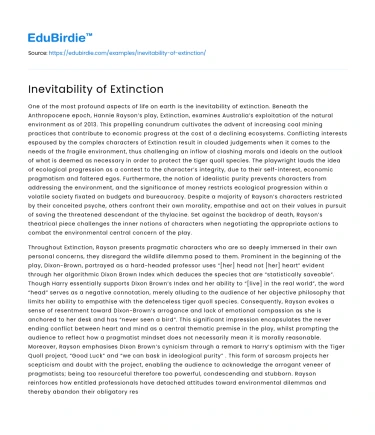One of the most profound aspects of life on earth is the inevitability of extinction. Beneath the Anthropocene epoch, Hannie Rayson’s play, Extinction, examines Australia’s exploitation of the natural environment as of 2013. This propelling conundrum cultivates the advent of increasing coal mining practices that contribute to economic progress at the cost of a declining ecosystems. Conflicting interests espoused by the complex characters of Extinction result in clouded judgements when it comes to the needs of the fragile environment, thus challenging an inflow of clashing morals and ideals on the outlook of what is deemed as necessary in order to protect the tiger quoll species. The playwright lauds the idea of ecological progression as a contest to the character’s integrity, due to their self-interest, economic pragmatism and faltered egos. Furthermore, the notion of idealistic purity prevents characters from addressing the environment, and the significance of money restricts ecological progression within a volatile society fixated on budgets and bureaucracy. Despite a majority of Rayson’s characters restricted by their conceited psyche, others confront their own morality, empathise and act on their values in pursuit of saving the threatened descendant of the thylacine. Set against the backdrop of death, Rayson’s theatrical piece challenges the inner notions of characters when negotiating the appropriate actions to combat the environmental central concern of the play.
Throughout Extinction, Rayson presents pragmatic characters who are so deeply immersed in their own personal concerns, they disregard the wildlife dilemma posed to them. Prominent in the beginning of the play, Dixon-Brown, portrayed as a hard-headed professor uses “[her] head not [her] heart” evident through her algorithmic Dixon Brown Index which deduces the species that are “statistically saveable”. Though Harry essentially supports Dixon Brown’s Index and her ability to “[live] in the real world”, the word “head” serves as a negative connotation, merely alluding to the audience of her objective philosophy that limits her ability to empathise with the defenceless tiger quoll species. Consequently, Rayson evokes a sense of resentment toward Dixon-Brown’s arrogance and lack of emotional compassion as she is anchored to her desk and has “never seen a bird”. This significant impression encapsulates the never ending conflict between heart and mind as a central thematic premise in the play, whilst prompting the audience to reflect how a pragmatist mindset does not necessarily mean it is morally reasonable. Moreover, Rayson emphasises Dixon Brown’s cynicism through a remark to Harry’s optimism with the Tiger Quoll project, “Good Luck” and “we can bask in ideological purity” . This form of sarcasm projects her scepticism and doubt with the project, enabling the audience to acknowledge the arrogant veneer of pragmatists; being too resourceful therefore too powerful, condescending and stubborn. Rayson reinforces how entitled professionals have detached attitudes toward environmental dilemmas and thereby abandon their obligatory responsibilities, however boast about their credentials. Similarly, Rayson presents Harry Jewell as an influential “Mr Evil” and the “biggest polluter” to the environment’s obliteration. Amidst the endangerment of the tiger quoll species, Harry continually justifies his profiteering coal mining practices, claiming “[he ] built highways and bridges and railroads” and provided the Chinese with fundamental “rights to electricity”. Subsequently, the prevalent dramatic irony further demises his supposed altruistic good deeds of funding the project due to his nostalgic memory of the quoll - many would consider this a contradiction to his palpable character arc. The playwright insinuates Harry as a symptomatic of a contemporary society, whereby the audience can infer the challenges of conservation in a world of destruction. Hence, Rayson establishes a nuanced idea of species conservation contaminated by human-kind’s egocentric needs, presenting a plateau in human evolution.
Save your time!
We can take care of your essay
- Proper editing and formatting
- Free revision, title page, and bibliography
- Flexible prices and money-back guarantee
As idealism pervades the mind of the protagonists of Extinction, the notion of moral purity halts conservational progression as emotional turmoil comes into play. Initially presented with a blunt, abrasive veneer, Andy ultimately masks his internal introspective suffering. Rayson alludes that Andy’s “life is [inevitably] over” because of his “inherited mutation”, paralleling the tiger quoll species’ decay toward extinction. This disgruntled mentality contributes to his self-deprecating isolation and fear of pain and suffering, prompting Rayson’s audience to sympathise with Andy’s pain in the face of impending death. As a vet, his arduous attempts to aid the injured tiger quoll in a “humane course of action”, however ultimately succumbs to euthanizing it. The word, “humane” emulates his paradoxical perception of death as an entity of inevitability, amidst his desire to end his life due to his GSS illness. Stereotyped as the “type of greenie who’s always saying no” colloquially affirms Andy’s predisposition to lash out on others due to his innate idealism and unrealistic principles. Rayson’s use of derogatory language emphasises the nuanced idea of mortality and the tiger quoll controversy. Concurrently, just as Andy lives his “life as a dying man”, an “innocent” species plummets to extinction. The motif of death encapsulates the essence of unanimous frailty and its repercussions – on both humans and existing biota. Unlike Dixon-Brown and Harry, Piper Ross has an adamant view of societal needs at the best interest of the tiger quolls. Her tendency to form spiritual connections to the Australian wildlife – “paradise” reoccurs throughout the play, albeit she burdens herself with the responsibility of “keeping everything alive”. Rayson plays on Piper’s delusional expectations and virtue of hope when Piper yearns for a “baby substitute” as she tends a possum - Rayson underlines the frailty of human emotion as a flaw where there is a clash between naive idealism and pragmatism beneath the conservational dilemma






 Stuck on your essay?
Stuck on your essay?

